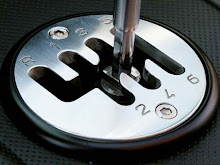I'm not a big fan of Toyota, i don't own any of their products nor would i buy a new one (but then again...i have vowed to never buy/lease another new car from anyone, ever again). but they've clearly got their work cut out for them with their recent quality woes.
On the one hand, they've had a hell of a run. it was bound to end eventually and that time has apparently come. with an item as complex as the automobile, and with most suppliers working to 6 sigma (ish) type quality standards, its inherent to the process's that roughly 6 defects are produced in every million parts. you design for that and then rely on your quality systems to catch the 6, but there is no product or manufacturing process that is 100% without problem. i.e. A problem of this type was bound to crop up eventually. So i can sympathize knowing that this was bound to happen and wishing that the public was a little more realistic in their expectations.
but on the other hand, they have had a hell of a run. and it's nice to see a bit of product realism injected into the public perception. maybe Toyota quality isn't really that much better than anyone else (anymore)! crazy idea, i know. It's rather easy for a company to take the level of public trust that Toyota has recently enjoyed for granted. when the public is having a love affair with your products you (can) become overly emotional about the relationship and let logic and common sense go.
as to a recall, there are a lot of monday morning quarterbacks out there questioning the timing, the decision, etc. etc. in fact most would say "when you know you have a problem, issue a recall", or "it's better to play it safe" even when you think it's a problem. that's certainly been the position with many in the media (particularly on NPR). but the simple fact is..it's not always the best course of action. in most cases a full-on recall isn't warranted (as opposed to a campaign or a service bulletin). and in the rare case that it is, it becomes a difficult balance timing wise. do you issue the recall before having a solution ready? or do you wait, sometimes weeks or months, to issue the recall knowing that defective product is out there? let's be real, a solution to a design/process defect can take weeks or months of development and testing to create.
and you must be sure it's correct.
and you have to make sure you understand the scope of the problem (how many parts may be out there and where?).
so even though Toyota may have known for a time that a recall is evident, it was probably prudent to wait until a solution was ready and they understood the scope of the problem - all the while risking further failures. a recalled product can never be un-recalled.
cold hearted? perhaps. but irrelevant.
practical? absolutely.
in the end the public will probably never know the whole story behind the product problems and the recall. these aren't the types of things that become clearly exposed in the public domain, no matter how many hearings the talking heads on capital hill hold. they're concerned about showing "concern" so they can get re-elected in the fall.
I do think a word of caution to GM (in particular) is wise at this point. a company never wins, or rather, rarely wins, by simply relying on the failure of your competition. This is not the break you've been looking for. you still have an uphill climb to get out of the hole you've dug for yourself. Realistically, is a customer who has shunned GM for toyota likely to return to GM, or switch to another automaker like Hyundai? It's ok to prey on this problem a little bit, but be careful. that type of attitude can quickly bit back when (not if) GM has it's next quality problem.
Subscribe to:
Post Comments (Atom)




No comments:
Post a Comment